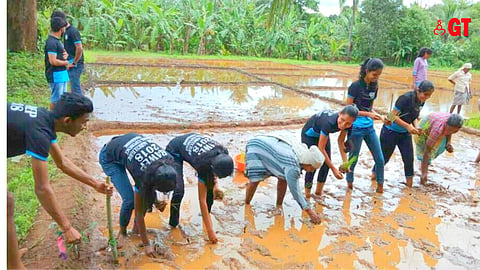

Goa had to be self-sufficient in food crops between 1954 and 1961 due to the ‘Economic Blockade’ of the ‘Estado da India Portuguesa’ (EIP) territories of Goa, Daman & Diu and Dadra & Nagar Haveli. We can honestly blame it on Pandit Jawaharlal Nehru as he was the Prime Minister of independent India at the time.
The United Nations would not allow him to capture Goa, so he decided to starve the colony into surrender. Soon after the Indian government annexed the EIP territories, China annexed a part of India in the Himalayas. Having said that, the ‘economic blockade’ taught the people of Goa how to cultivate crops even on marginal lands just to survive and outlive the blockade till Liberation.
RICE-GROWING TECHNIQUES
The traditional cultivation of rice was by seeding with dry or pregerminated paddy seed, before or with the onset of, the South-West monsoon rains in June. The Konkani terms xell, chobo, rov for the traditional methods of sowing are not even known to the present generation. The Japanese method of transplanting is in vogue where the rice transplanter machines have not yet reached.
Only a few farmers have adopted the Madagascar method of transplanting and cultivation by the system of rice intensification or SRI. It has been popularized by the Goa Directorate of Agriculture since the turn of the millennium and the students of the Don Bosco College of Agriculture in recent years.
With widespread cancer in Goa, where no cases of cancer were reported till the 1960s, people have begun thinking of pesticide-free food, whether organic or naturally grown. Non-availability of labour, and high wages when available, were a deterrent to rice cultivation, and fields have been left fallow since the 1990s.
The introduction of the mechanized combine harvester-thresher with ‘custom service’ subsidy started a flow of farmers back into the fields. The era of mechanized paddy seedling transplanters, started by Fr George Quadros, sdb, and boosted by the return of Covid-displaced NRI drivers, mechanics and sailors from cruise liners, capable of handling these machines, as well as bankers and accountants knowing how to handle a business enterprise, has been an injection of fresh blood and ideas into agriculture.
PESTICIDE TRUTHS
If the first World War gave us chlorinated hydrocarbons like DDT (Di-chloro, Di-phenyl, Tri-chloro Ethane) or radioactive BHC (Benzene Hexa Chloride), the Nazi gas chambers of WW2 gave us so many of the very familiar organo-phosphorus insecticides, manufactured by the same companies that produced the war chemicals.
The Covid-19 pandemic has brought us back to our senses. What began as growing vegetables at home, in pots and trays on balconies and terraces if one did not have land on the ground, has given the people in Goa a taste of pesticide-free vegetables.
The Green Heritage Eco Club of SFX High School, Siolim, Bardez, Goa, which has been organising the annual Festival of Plants & Flowers since 1992, has enabled and empowered the youth and adults in life skills. The tiny tots in KG, back then, are thirty-plus years of age and young parents today and the sixteen-plus students in the Higher Secondary in 1992 are close to their golden jubilee on earth. Students from across Goa participate in the workshops, projects and exhibition. You can join them today, Monday, August 22, 2022, between 10 am and 6.00 pm.
The author is the former Chairman of the GCCI Agriculture Committee, CEO of Planter's Choice Pvt Ltd, Additional Director of OFAI and Garden Superintendent of Goa University, and has edited 18 books for Goa & Konkan